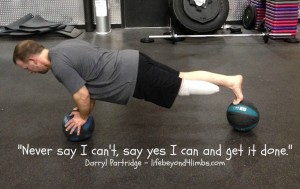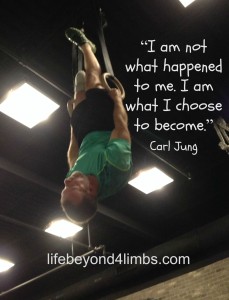The following are the six things that I attribute to my success in quickly becoming a confident, active and fully independent single-leg amputee. Each of the five recommendations can be adjusted to fit any lifestyle the individual amputee wants. You also don’t have to be an amputee to take something away from reading this. I sugarcoat nothing; they are from the School of Hard Knocks, but like everything else in life you don’t gain anything without hard work. “No pain, No gain”
Adopt the right attitude:
“I am not what happened to me. I am what I choose to become.” ~ Carl Jung
This quote is so true – it is up to you what you become.
The attitude you choose will 100% determine what your life as an amputee will be like. You have two choices: you can either let amputation destroy you, or you can let it strengthen you. Every day I am well aware of how quickly dealing with amputation could spiral downward into depression. I refuse to let it; I choose to live positively with my circumstances. Having a positive attitude is very powerful. Something as simple as getting in the habit of replying “very well” or “excellent” to the question, “How are you today?” makes a huge difference in how you start to feel.
Embracing my next five suggestions will be very beneficial in helping you maintain a positive attitude and living a full active life.
Invest in the crutches:
 Your goal will be to get fitted for a prosthesis and learn to walk with it. The prosthesis will become the main ambulatory device you use, but without a backup assistive devise you will find yourself immobile an awful lot. I am all for whatever works best for the individual amputee as long as they can remain happy independent amputees. I view my prosthesis and my crutches as tools, and I use the tool that works best for the job. I am a very active, independent, full-time employed amputee! To maintain an independent and productive lifestyle as a lower-limb amputee, both my prosthesis and my crutches are very necessary tools. I use both independently of each other daily to maintain a normal and highly productive life.
Your goal will be to get fitted for a prosthesis and learn to walk with it. The prosthesis will become the main ambulatory device you use, but without a backup assistive devise you will find yourself immobile an awful lot. I am all for whatever works best for the individual amputee as long as they can remain happy independent amputees. I view my prosthesis and my crutches as tools, and I use the tool that works best for the job. I am a very active, independent, full-time employed amputee! To maintain an independent and productive lifestyle as a lower-limb amputee, both my prosthesis and my crutches are very necessary tools. I use both independently of each other daily to maintain a normal and highly productive life.
I do understand that crutches can be difficult for some people to use, and there are medical conditions that would prevent someone from using them. If a medical condition doesn’t prevent you from using crutches though, investing the time and effort into learning to become comfortable and proficient on them will be invaluable. Having the ability to use a pair of crutches as a single-leg amputee gives you another tool for your independence. For the rest of your life you are going to have times when you won’t be wearing the prosthetic. The stump sometimes just needs a break; morning bathroom routines, relaxing in the evening, night-time bathroom trips, various activities such swimming or when dealing with stump and prosthetic issues. I find that having crutches available to quickly grab and go with, to accomplish these things without the prosthetic, makes all the difference in being a 100% active and independent amputee. I can’t stress enough how much being willing to integrate crutches into my life has helped. Do some research in finding a quality pair of crutches that work for you, and then invest the effort into learning to be independent with them. Discovering the value of crutches will take a whole lot of stress out of only having one leg. View crutches as tools that help you, not torture devices that hinder you.
“Crutches are an absolute necessity, especially for a single-leg amputee because they provide the most efficient means of transportation.” ~Madeleine Anderson http://www.amputeecoalition.org/inmotion/mar_apr_10/overview_crutches.html
Find Your Independence:
This isn’t a leg injury that you lay around with, getting waited on for six weeks and then it’s over. Yes, you will need someone to help you in the beginning and you must accept the help, but this is for life. It is very important that you get up and take back your independence as quickly as possible. It might seem cruel and harsh, but I can’t stress how important independence is. The loss of a leg will certainly make you feel completely dependent on others. With some hard work and determination you will soon learn that you can do much more than you thought. Each day, take back doing one additional thing for yourself. It won’t be easy; things will get spilled. There will be plenty of tears. You will become an excellent hopper and your sound leg will become very tried, but in the end your gains will be well worth the struggles. I cried while trying to navigate the men’s room on my first day back to work, five weeks post-op, but I went back and mastered it the next day. (Large area, no grab bars, pants fell off, what I can say?) Accomplishing things independently will give you confidence, help you remain positive and boost your overall recovery.
Get Physical:
We have all heard the saying, “A body in motion wants to stay in motion. A body at rest seeks more rest.” The quicker you get your body back in motion, the better off you will be. The longer you sit, the tougher it will be to get up and get your life back, even after you get your prosthesis. You will need strength and a great deal of balance to succeed with the prosthesis. There are so many ways of getting plenty of exercise while non-weight bearing, both at home and at a gym. Just getting up and moving around the house on crutches is great exercise. Once the stump is healed, I can’t emphasize how much getting involved in physical activities can help you. The confidence, balance and independence I have gotten from pushing myself physically has made my life wonderful and complete.
It doesn’t matter where you start, what counts is that you start and don’t give up.
Make sure you clear exercise with your doctor before starting.
Don’t Limit Yourself:
 Never say “I can’t.” Being an amputee doesn’t mean your life is over. Decide how you want to live and put the work in to get there. Don’t limit yourself because you think an amputee can’t do something. You can accomplish anything you want. Be determined, set goals and work hard to accomplish them. Sometimes it’s painful, frustrating and an immense amount of work, but I have accomplished everything I set out to since becoming an amputee.
Never say “I can’t.” Being an amputee doesn’t mean your life is over. Decide how you want to live and put the work in to get there. Don’t limit yourself because you think an amputee can’t do something. You can accomplish anything you want. Be determined, set goals and work hard to accomplish them. Sometimes it’s painful, frustrating and an immense amount of work, but I have accomplished everything I set out to since becoming an amputee.
Find a Hobby or Activity You Enjoy:
 This is how you make yourself feel whole and full again. Immerse yourself into an activity that you can become passionate about. Music, sport, art, writing, pottery – anything that makes you feel good! My father in-law retired to Florida and has made his life wonderful by immersing himself into playing music. It makes his life full and enjoyable. He is not thinking about being retired because he is having the time of his life doing something he loves. I didn’t think I could ever find something that could give me that feeling after losing my mobility and then facing amputation. However, I have found something and it has made my life wonderful. For me it’s challenging myself though exercise and sport. Having that focus on something that gives you fulfillment and enjoyment takes the focus off what you’ve lost and gives your life fullness.
This is how you make yourself feel whole and full again. Immerse yourself into an activity that you can become passionate about. Music, sport, art, writing, pottery – anything that makes you feel good! My father in-law retired to Florida and has made his life wonderful by immersing himself into playing music. It makes his life full and enjoyable. He is not thinking about being retired because he is having the time of his life doing something he loves. I didn’t think I could ever find something that could give me that feeling after losing my mobility and then facing amputation. However, I have found something and it has made my life wonderful. For me it’s challenging myself though exercise and sport. Having that focus on something that gives you fulfillment and enjoyment takes the focus off what you’ve lost and gives your life fullness.
I have said it many times – I live a happy, active, fulfilled life with one leg. It wasn’t by accident either; it took choosing a positive attitude, determination to live without limits and a whole lot of work. It never ceases to amaze me how much the human body can adapt to if the mind is willing. It’s never over – the positive attitude, determination and hard work need to continue every single day. There is nothing easy about being an amputee, but you can still enjoy life. I have never put so much work into living, but the payoff has been well worth the effort.
Thank you for reading! Please subscribe to never miss a post or come back in two weeks for my next post, highlights of my year as an amputee.
Also follow my story on Facebook.




